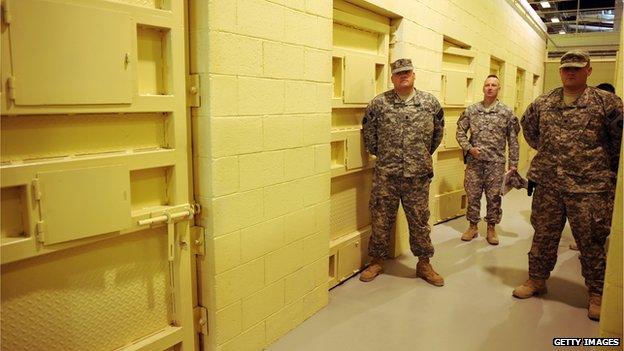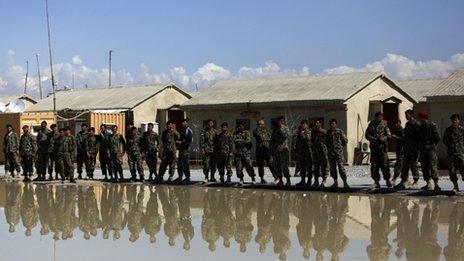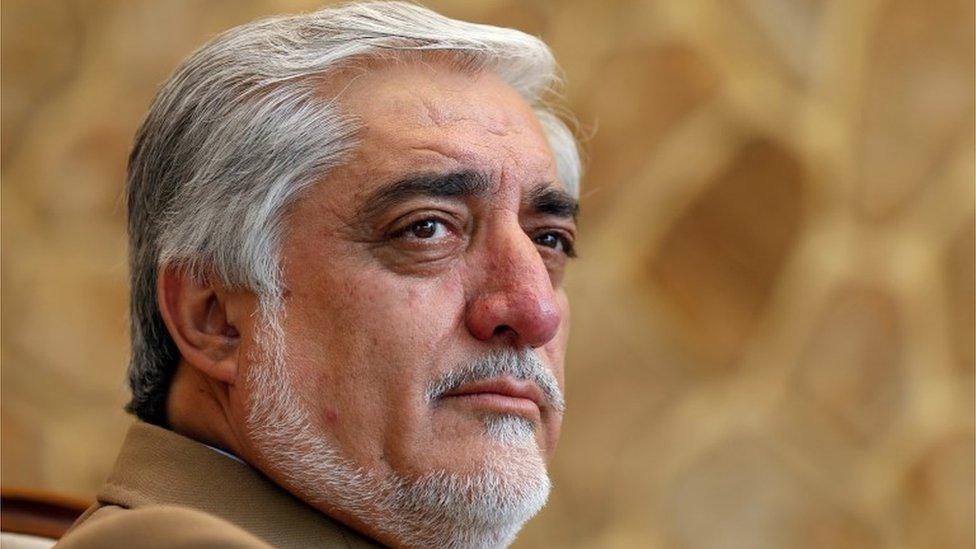Bagram ex-detainees say they still bear the scars
- Published
Sanjoy Majumder speaks to two ex-detainees released from Bagram prison in 2010
In December the US Senate released a report on the CIA's interrogation of al-Qaeda suspects including the use of torture carried out in detention facilities. One of the sites identified was at the Bagram airbase in Afghanistan. The BBC's Sanjoy Majumder has met two ex-Bagram detainees.
I meet Niaz Gul and Sardar Khan at a park in the Kabul neighbourhood of Wazir Akbar Khan on a winter morning. It is a quiet, secluded location with hardly anyone about.
The men have travelled overnight from the eastern Kunar province, which is where they are from. Both men are in their mid-30s but look older. Four years ago they were released from Bagram prison, north of Kabul.
Over a cup of green tea, they tell me their story.
"I was asleep - it was after midnight - when a group of American soldiers burst into my house," Niaz Gul says.
He was arrested along with his father and brother.
"Our hands were tied behind our backs and we were led out to a waiting vehicle. We were taken to a military camp and then flown to Bagram."
Sardar Khan, too, was picked up from his home during another late-night raid by US troops.
"They banged my head against a wall," he says, pointing to his forehead. "I was bleeding as I was bundled into a vehicle."
Charges not proven
Kunar province is along the Pakistan border where Taliban and al-Qaeda militants are active and it sees frequent clashes between coalition forces and insurgents.
"They accused me of firing on Nato troops. It was not true and was based on misinformation," Sardar Khan says. He too was taken to Bagram where he was to be detained for the next 18 months.

The US handed Bagram prison over to Afghan authorities in March 2013
"They were never able to prove their charge against me, so eventually they had to release me," he adds.
The Bagram air base north of Kabul was until recently a US military facility which also housed one of its biggest detention centres in Afghanistan.
Like other Bagram detainees, the two men were sometimes held in small isolated cells - other times in metal cages filled with prisoners.
Sardar says they were frequently interrogated.
"When we wanted to sleep, they used to play loud music. They didn't let us rest," he says. Niaz shakes slightly as he recalls his ordeal.
"We were kept in a very small space. We didn't know whether it was day or night. They didn't let us use the toilet so many prisoners urinated on their clothes."
Sometimes the men were forced to shower in either very hot or very cold water.
Mental trauma
"To punish us, they would put us in a room with the air-conditioning on and they would take away the blanket. So we would be freezing," Niaz says.
Both men described how they would often hear other inmates talk about being beaten.
"Some of the men would be so upset, they would beat their heads against the bars of our cell," says Sardar.
Niaz Gul spent 22 months at Bagram before being released and declared innocent. But life has not been easy for them. Both say they suffer from mental trauma and frequent headaches.
"I get angry easily now, with my family and with others," says Niaz. "My whole life has been turned upside down."
After our conversation, Niaz and Sardar shake my hand and embrace me in the Afghan tradition. Then they leave.
Both of them spent close to two years in detention. They now want to know why they were taken and who will be held accountable for what they were put through.
- Published25 March 2013

- Published6 January 2015

- Published29 September 2014

- Published26 September 2019

- Published27 September 2019
